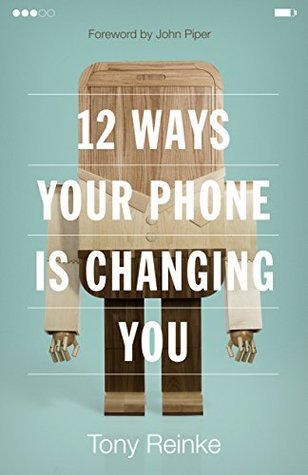More on this book
Community
Kindle Notes & Highlights
Our phones are addictive, and, like addicts, we seek hits immediately in the morning. And, yes, there’s an app for that.
First, we use digital distractions to keep work away. Facebook is a way of escape from our vocational pressures. We procrastinate around hard things: work deadlines, tough conversations, laundry piles, and school projects and papers. The average American college student wastes 20 percent of class time tinkering on a digital device, doing things unrelated to class (a statistic that seems low to me!).5 When life becomes most demanding, we crave something else—anything else. Second, we use digital distractions to keep people away. God has called us to love our neighbors, yet we turn to our phones
...more
and to let everyone know we’d rather be somewhere else.
In a meeting or a classroom, if my phone is put away, I am more likely to be perceived as engaged. If my phone is not in use, but is faceup on the table, I present myself as engaged for the moment, but possibly disengaged if someone more important outside the room needs me. And if my phone is in my hand, and I am responding to texts and scrolling social media, ...
This highlight has been truncated due to consecutive passage length restrictions.
Third, we use digital distractions to keep thoughts of eternity away.
“I have discovered that all the unhappiness of men arises from one single fact, that they cannot stay quietly in their own chamber.”
anything “which monopolizes the heart’s concerns.”
Unchecked distractions that blind souls from God.
Unchecked distractions that close off communion with God.
Unchecked distractions that mute the urgency of God. Marriage
True distractions include anything (even a good thing) that veils our spiritual eyes from the shortness of time and from the urgency of the season of heightened expectation as we await the summing up of all history.
No—there may have been a predigital age, but there has never existed a life without distractions.
From the outset of this study, we must die to the idea that a distraction-free life is possible—
The more distracted we are digitally, the more displaced we become spiritually.
1. Do my smartphone habits expose an underlying addiction to untimely amusements? 2. Do my smartphone habits reveal a compulsive desire to be seen and affirmed? 3. Do my smartphone habits distract me from genuine communion with God? 4. Do my smartphone habits provide an easy escape from sobered thinking about my death, the return of Christ, and eternal realities? 5. Do my smartphone habits preoccupy me with the pursuit of worldly success? 6. Do my smartphone habits mute the sporadic leading of God’s Spirit in my life? 7. Do my smartphone habits preoccupy me with dating and romance? 8. Do my
...more
We sin with our phones when we ignore our street neighbors, the strangers who share with us the same track of pavement.
“In a solid, God-chosen relationship with Jesus, man’s disapproval cannot hurt you and man’s approval cannot satisfy you. Therefore, to fear the one and crave the
The sad truth is that many of us are addicted to our phones because we crave immediate approval and affirmation.
“If you want to internalize a piece of knowledge, you’ve got to linger over it.”
But whatever the cause, the literacy problem we face today is not illiteracy but aliteracy, a digital skimming that is simply an attempt to keep up with a deluge of information coming through our phones rather than slowing down and soaking up what is most important.
Those who are aliterate have difficulty separating what is eternally valuable from what is transient. They skim, but not in order to identify and isolate what needs to be studied more carefully and meditatively. Because the aliterate cannot navigate this distinction, they struggle to draw relevance from written texts, especially ancient texts.
“The commerce and communion between God and his people is an inherently textual phenomenon. The eternally eloquent God has stooped to speak a word of saving consolation to us,” writes theologian Scott Swain. “Because Scripture is the supreme locus of God’s self-communication in the world, Christians are ‘people of the book.’ The Lord gathers, nourishes, defends, and guides his people through this book; and his people assemble around, feed upon, find shelter in, and follow after the words of this book.”
It is part of our creatureliness that we are easily distracted; it is part of our sinfulness that we are easily lured by what is vain and trivial.
First, the aim of the Bible is discipleship, to continually form and re-form our thinking, our habits, and our behaviors.
The smartphone is causing a social reversal: the desire to be alone in public and never alone in seclusion.
Solitude is a precious gift: we all want it, we all need it, and we all think more technology is the secret. It’s not,
First, in all the noise, Christians must identify and cherish wisdom.
Second, in all the noise, Christians must strive for fearful obedience over frivolous information.
Third, in all the noise, we must embrace our freedom in Christ, as we step back from the onslaught of online publishing and the proliferation of digital sages.
But God prevents the wounded from becoming the wounders.
Charles Spurgeon: “The easiest work in the world is to find fault.”
“We must play,” Lewis says about our relationships. “But our merriment must be of that kind (and it is, in fact, the merriest kind) which exists between people who have, from the outset, taken each other seriously—no flippancy, no superiority, no presumption.”
“I now see that I spent most of my life in doing neither what I ought nor what I liked.”2


